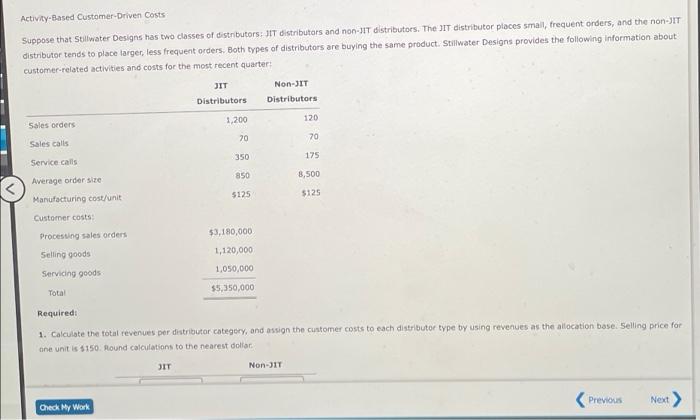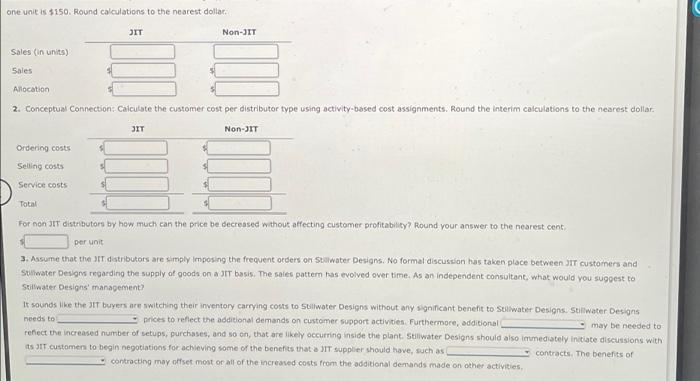Activity-Based Customer-Driven Costs Suppose that Stillwater Designs has two classes of distributors: JIT distributors and non-JIT distributors. The IT distributor places small, frequent orders, and the non-JIT distributor tends to place targer, less frequent orders. Both types of distributors are buying the same product. Stillwater Designs provides the following information about customer related activities and costs for the most recent quarter: JIT Distributors Non-IT Distributors 1,200 120 Sales orders 20 70 Sales calls 350 125 Service calls 850 8,500 Average order size Manufacturing cost/unit 5125 $123 Customer costs Processing sales orders Selling goods $3,180,000 1,120,000 1,050,000 Servicing goods $5,350,000 Total Required: 1. Calculate the total revenues per distributor category, and assign the customer costs to each distributor type by using revenues as the allocation base. Selling price for one unit is $150. Round calculations to the nearest dollar JIT Non-JIT Previous Next > Check My Work one unit is $150. Round calculations to the nearest dollar JIT Non-IT Sales (in units) Sales Allocation 2. Conceptual Connection: Calculate the customer cost per distributor type using activity-based cost assignments. Round the interim calculations to the nearest dollar JIT Non-JIT Ordering costs Selling costs Service costs Total For non IT distributors by how much can the price be decreased without affecting customer profitability Round your answer to the nearest cent per unit 3. Assume that the distributors are simply Imposing the frequent orders on Suolwater Designs. No formal discussion has taken place between IT customers and Stillwater Designs regarding the supply of goods on or basis. The sales pattern has evolved over time. As an independent consultant, what would you suggest to Stillwater Designs management? It sounds like the IT buyers are switching their inventory carrying costs to Sulwater Designs without any significant benefit to Sullwater Designs. Stillwater Designs needs to prices to reflect the additional demands on customer support activities. Furthermore, additional may be needed to reflect the increased number of setups, purchases, and so on, that are likely occurring inside the plant Stillwater Designs should also immediately initiate discussions with its IT customers to begin negotiations for achieving some of the benefits that a IT supplier should have, such as contracts. The benefits of contracting may offset most or all of the increased costs from the additional demands made on other activities








